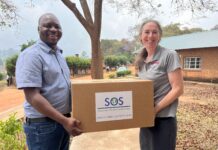LOUISVILLE, Ky. – University of Louisville Public Health doctoral student Caroline Chan is working to create scientific tools to help environmental policy decision makers evaluate and modify mercury emission regulations. This could ultimately help minimize mercury contamination in the food web.
Chan plans to build a model that will simulate how mercury travels downwind from an emissions source to waterways and into the food web, leading to contamination of fish – the source of human exposure.
“This project is unique because I’m looking at the entire system of how mercury travels from the original emission source to humans,” said Chan. “Many models only evaluate a single component such as how mercury is deposited from the atmosphere to land.”
The specific evaluation sites will include the Rough and Mud Rivers – waterways near the TVA Paradise Fossil Plant. Tygarts Creek and the Little Sandy River in eastern Kentucky will be used as controls since there are no known mercury emission sources in that area.
Chan will build her model in three stages, and then create a master model to link local mercury emissions to human mercury exposure. The first stage will predict mercury levels in the blood and hair of subsistence fishers, anglers and women of child-bearing age who eat fish from the Kentucky streams. The second stage will evaluate how mercury accumulates through the food chain in these waterways. Finally, Chan will simulate the movement of mercury from the emission source to land and water.
“The master model can then help policy makers determine if proposed regulatory scenarios or watershed management strategies are adequate in bringing fish tissue mercury levels into compliance with water quality standards, and more importantly, in reducing risk to those most susceptible – subsistence fishers, anglers and women of child-bearing age,” Chan said.
Chan’s work is being funded through the Environmental Protection Agency’s STAR graduate fellowship program that supports master’s and doctoral candidates in environmental studies. The three-year fellowship begins this year and pays a $20,000 stipend, plus tuition and $5,000 for expenses such as books, supplies and travel each year. Learn more about the program on-line: www.epa.gov/ncerqa/fellow/ .






























